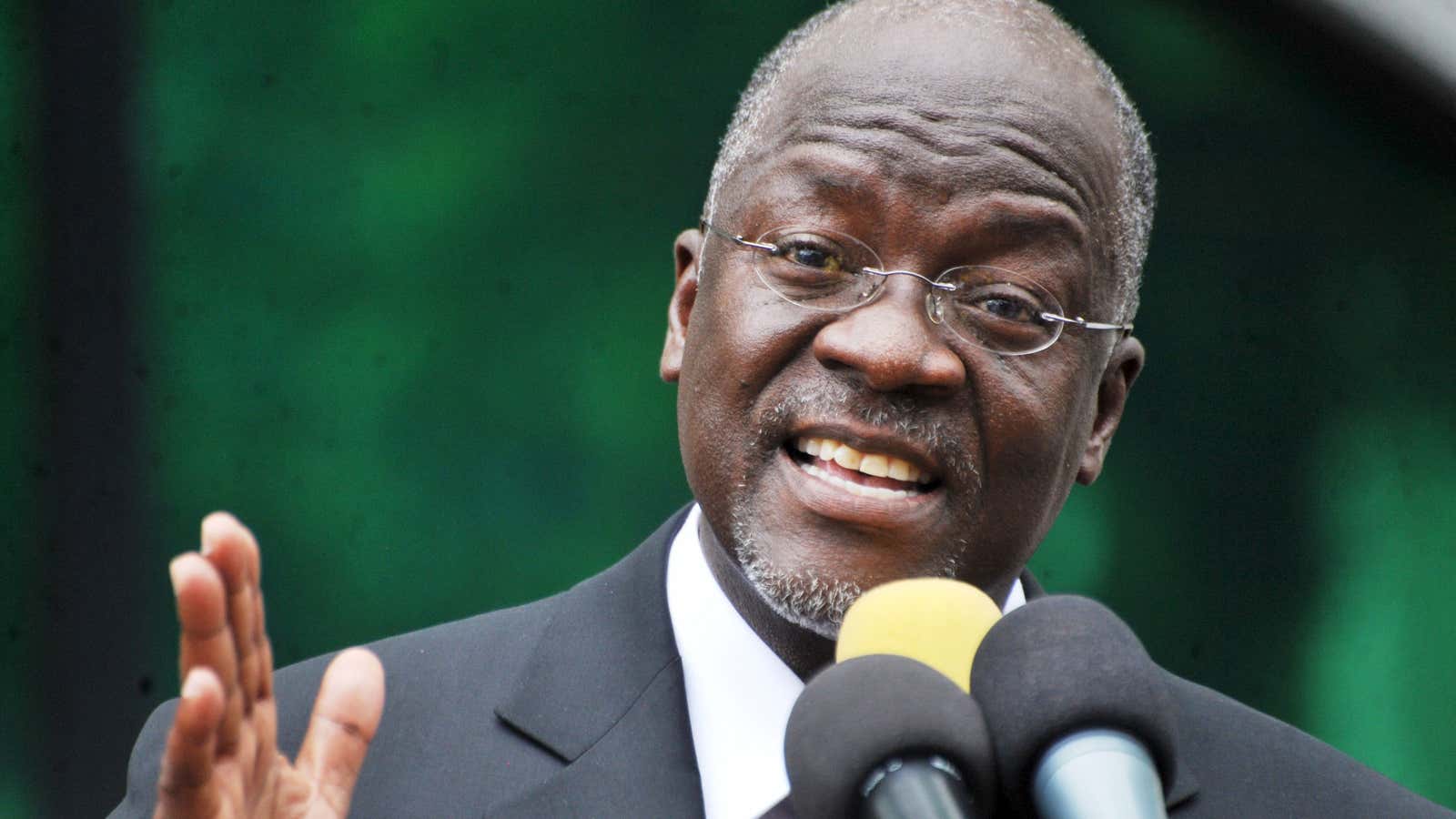When he came to power in Nov. 2015, there were great expectations that Tanzanian president John Magufuli was all the country needed to fight corruption, improve service delivery to the citizens and enhance the democratic space.
It hasn’t quite worked out that way.
He has not only suppressed the opposition but also hobbled press freedom by routinely threatening to shut down media houses for “inflammatory” reporting rather than focusing on development issues.
Last week, he fired information minister Nape Nnauye, who had ordered the investigation of a regional commissioner Paul Makonda (said to be the president’s close ally). It is claimed the commissioner had tried to pressure a private media house to air the footage of a paternity case involving a political nemesis. A day after the minister’s sacking, the president warned media houses to be careful lest they be shut down for thinking they have the freedom to write or air whatever they want.
Also last week, a local rapper Nay wa Mitego was detained for releasing a song officials considered offensive to the administration. A day later, the artist was released on the orders of the new information minister, Harrison Mwakyembe. The song castigates the administration for muzzling free speech in the country.
In the Kiswahili lyrics, the artist supposedly addresses one thought to be the president; “Which sort of person are you? You don’t want to be counseled. You don’t want to be criticized. You are bewitched.”
A government spokesperson said the musician’s freedom was to allow him to amend the song, implying that the newer version would tone down its criticism of the administration.
“These are trying times, but we are well aware that it is our duty as citizens to ensure that our constitution is protected,” says Maria Sarungi-Tsehai, director at Change Tanzania, one of whose pillars is championing freedom of expression in the country.
She observes that Magufuli has perfected the repression of free speech his predecessor started. Defective and oppressive regulations like the Cybercrime bill were passed and signed into law by Kikwete’s administration in 2015.
“With the Cybercrime law, now even mere gossip is criminalized and people are arrested and prosecuted as criminals. This has brought about a lot of uncertainty and fear among common users,” Sarungi-Tsehai says. “Many stakeholders and regular citizens feel that the space is narrowing.”
Last December, the director of Jamii Forums, an online discussion network, was charged under the Cybercrime law for supposedly obstructing investigations for not handing over the details of users of his site. The Statistics Act was also enacted with the intention of criminalizing publication of false, misleading or inaccurate reports or data not approved by the statistics bureau. The worrying trend of criminalizing free speech both on and offline continues to use up the goodwill Tanzanians had in Magufuli at the start of his administration.
Magufuli seems to have mutated from a man of the people, highly regarded at home and abroad, to become one who declares war on free speech and that has independent journalists like Erick Kabendera anxious.
Unlike his predecessor, Magufuli, has taken media repression a notch higher by shutting down media outlets critical of him and jailed ordinary citizens accused of abusing him on social media. Like several other African leaders, he has enhanced social media policing although he continues to attract more criticism online.
“The level of censorship now is unprecedented in Tanzania’s recent history. He is anti-democracy and the opposition has described him as autocratic,” Kabendera tells Quartz.
“He doesn’t listen to the public and there are concerns in political circles, the civil society and the media that he only listens to himself,” Kabendera, who started a hashtag ridiculing the president for apparently being hard to please, observes.
The hashtag #ReportersUnderMagufuliEra, which has been trending since Mar. 26, has users mocking Magufuli and his style of leadership, which they deridingly say, has taken the country to greater heights.
Critics have vilified him for loving too much publicity at the expense of objective reporting however constructively critical it is to his administration. Ironically, he has a penchant for personally phoning media houses to praise them whenever they shower him with praises.
Despite growing discontent at home, Magufuli has somewhat managed to portray himself globally as a progressive and forward thinking leader. “Our country is moving in the right direction. If you go abroad, everyone appreciates this. Here (at home), nobody appreciates it,” he remarked on Mar. 24.
